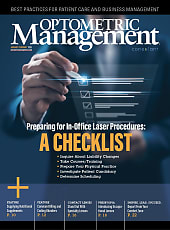
At Vision Expo West 2025, Jessilin Quint, OD, MBA, FAAO, co-owner of Smart Eye Care with multiple locations in Maine, hosted an accredited education course, “Top 5 Practice Problems and How To Avoid Them.”
The program highlighted five common challenges practices face: inefficient patient flow and scheduling, inadequate staff training and utilization, weak optical sales and product positioning, poor patient communication and retention, and compliance concerns.
Drawing on practice management courses, business insights, and peer experiences, Dr. Quint guided participants through common symptoms, root causes, and practical solutions to strengthen both patient care and practice performance.
EB connected with Dr. Quint to get more insight into her perspective on these common issues practices face and tips for ECPs to manage them.
Eyecare Business: What advice can you give to ECPs who struggle to balance the business of eye care with the clinical?
Jessilin Quint, OD, MBA, FAAO: It's always a juggle to balance the business side with the clinical side—the two kind of go hand in hand. Because the best patient care oftentimes leads, ultimately, to a better business kind of modality and practice, and sometimes there's no perfect balance. That's what our responsibility is as practice owners and as optometrists—to make sure that we're doing whatever it takes to deliver the best care for our patients [while] also keeping our staff happy.
EB: In your experience, what’s the most common issue that keeps practices from running efficiently?
Dr. Quint: I think a very common issue that will sometimes keep practices from running efficiently is a lack of insight. In optometry, it's a really unique situation because, a lot of times, the business owner is also the clinician who’s seeing patients. And so, when you're busy seeing patients, you're not always seeing what's happening at the front desk. Sometimes we lose the pulse on what's actually happening.
It's easy to kind of lose touch with what the true patient experience is like, and as practice owners, we take it very personally. We have to be really open to constructive feedback and criticism.
With private practice, anything that's prevention—anything we can do to prevent an issue—is usually much easier than trying to correct for it down the road.



